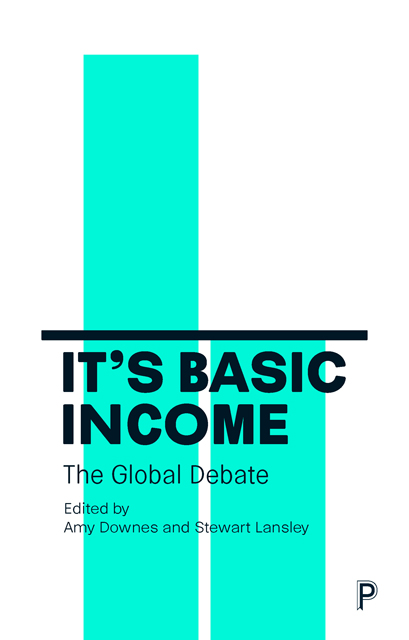3 - An economic shock absorber
Published online by Cambridge University Press: 11 April 2023
Summary
‘Basic incomes would provide a bit of financial padding for future downturns … This would have the additional benefit of tempering any loss of spending and thereby reducing the negative demand shock of the downturn.’
The idea of the job as we’ve long known it is slowly unravelling. Things that we’ve been taught to expect – full-time employment, training, and opportunities for promotion – are all eroding. What sort of world will we have if these trends continue? And how long could it remain stable?
While the global middle class (in emerging nations) has experienced gains in recent years, those at the top of the economic heap are still pulling away from the pack. And the gains experienced by the former group look vulnerable as developing nations around the world cue up to vie for limited opportunities. In general, the ‘have nots’ are less likely to be moving in a direction of safety, security, and self-actualisation, and more likely to be scrambling to survive in ever more precarious circumstances.
The widely shared prosperity of the mid-20th century increasingly appears to have been an historical anomaly. Throughout the middle of the 20th century, American workers enjoyed rising wages that roughly tracked rising productivity. Since then, wage levels have largely stagnated, while CEO pay has boomed.
As the US unemployment level subsides, there’s hope that wages will finally head in a better direction, and the 2016 US Census Report gave us surprisingly good news to that end. From 2014 to 2015, median household income rose 5.2% (the first such increase since the Great Recession), the number of full-time, year-round workers increased by 2.4 million, and the number of people living below the poverty line dropped by 3.5 million. But another recent study suggests that half a billion jobs will be needed ‘as soon as 2020’ to eliminate the global glut of unemployment, while also providing those necessitated by population growth. (Don’t worry. We’ll figure out how to make them into good jobs later.) So while forces inside the US economy may favour local workers, others on the outside will continue to provide a countervailing force.
The income gains that the census uncovered are being heralded by some as a sign that we’re finally headed for brighter days. If this trend continues, then my argument might end up well off the mark.
- Type
- Chapter
- Information
- It's Basic IncomeThe Global Debate, pp. 24 - 30Publisher: Bristol University PressPrint publication year: 2018



